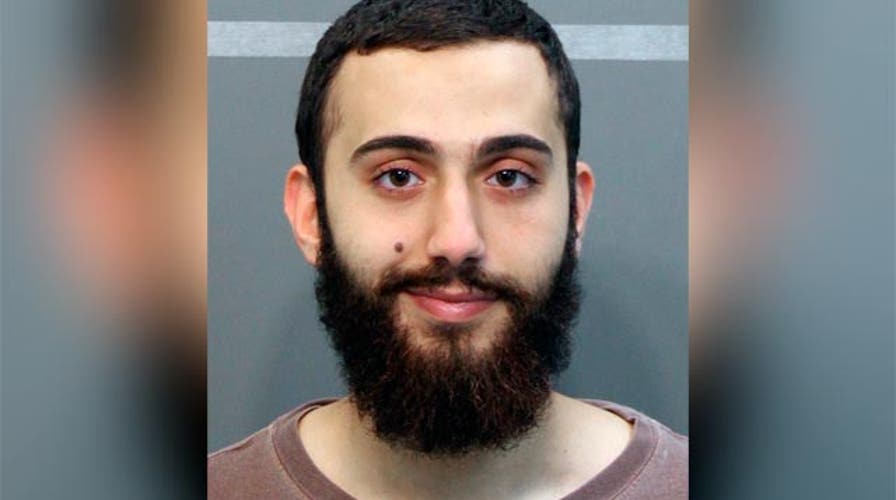Tenn. gunman: A sign of more attacks to come?
Was the gunman who killed four Marines a 'lone wolf' or part of a larger network? And is he the 'new normal' in terror?
This is a rush transcript from "On the Record," July 16, 2015. This copy may not be in its final form and may be updated.
GRETA VAN SUSTEREN, FOX NEWS HOST: The nation is on edge. Four of our marines gunned down here at home, an act of terrorism. Terror expert and Author of "The Coming Revolution," Walid Phares joins us.
Good evening, sir.
WALID PHARES, TERRORISM EXPERT: Good evening.
VAN SUSTEREN: And Jennifer says that the secretary of defense calls this a heinous crime. Maybe he also called it terrorism. I don't know. But, you know, when you have someone who, you know, who is raised in Kuwait, I mean naturally you are suspicious this isn't just a crime but this is much more.
PHARES: It's certainly a crime. Every act of terrorism is a crime. So if a double definition of what it is. What we are interested now in the U.S. is to determine the kind of operation. This is a terror operation, killing military. Part of it so far, I think, fits with the Jihadi description. They are targeting the military. We have seen that before. They are doing multiple -- trying to do multiple action and it ended up as a suicide mission, there is a part that I don't think is clear yet. Where was he radicalized?
Usually, if there previous cases we would see a lot of Facebook, social activities that show us. So far we haven't seen this. And the issue of Kuwait, well he was born in Kuwait but we don't know was he a Kuwaiti or Palestinian or another ethnicity, we don't know.
VAN SUSTEREN: And I don't mean to jump the gun on that. That's probably what people are suspicious about tonight. We got to investigate, we got to get the facts, someone has got to get in and look at his computer to see what he has been doing. But even if he doesn't connect it to some sort of network there are also copy cats. That's the other problem, people who willing to do the unthinkable.
PHARES: It is absolutely a copycat modified -- that's actually what both Al Qaeda and ISIS and other terrorist organizations have asked anybody radicalized around the world to do. Look what we have done before in this case the Arkansas shooting in 2009 and then do better. And then unfortunately we may see other copy cats in the future.
VAN SUSTEREN: If you have sort of a death wish, it's difficult to fight that. If someone is willing to give up their life, no sense of survival instinct, not wanting to protect themselves, willing to go in with a gun and shoot until everybody else is dead and he is dead, too.
PHARES: Well, we call it from our perspective death wish, from his ideological perspective it's getting to eternal life and all the goodies that comes after that. And that we don't have a weapon against it, we actually have one weapon that we have not used, which is counter indoctrination, unfortunately the government is not in that business at this point in time.
VAN SUSTEREN: And I should say that CAIR, which is the national Muslim organization, is very quick to come out and condemn and issue condolences. Because I know they have taken a lot of heat in the past. But they have very quickly come out and condemned this.
PHARES: Yes they did. And now the issue they have to condemn the ideology that is producing this. But this is an old debate that's not going to end tonight I think.
VAN SUSTEREN: So where would you begin to investigate this? Look at his computers, is that a good start, let's see who he hangs out with.
PHARES: Absolutely. Computer is very essential, people who know him are very essential. I think the government is way ahead of us.
VAN SUSTEREN: I am sure they are right now. Don't you think I mean wouldn't you expect this?
PHARES: In my little research that I've done, and sometimes you also have help, we learned more than what we know right now in terms of the possibility of being radicalized between here and another country. But we are looking at this at this point in time.
VAN SUSTEREN: As far as we know he has remained here in the United States since he came here from Kuwait, right. He has not been traveling back and forth as far as we know tonight.
PHARES: But has he met with people who have traveled is the question. So now the government has to go back years in time and see who did he meet on campus? Who did he meet before? What conference did he attend and what were the readings he had?
VAN SUSTEREN: It's too bad we do the investigation after the murders. I don't know how you do it before, but that's, you know, these four families tonight my heart bleeds for them, Walid, thank you.
PHARES: Thank you.

